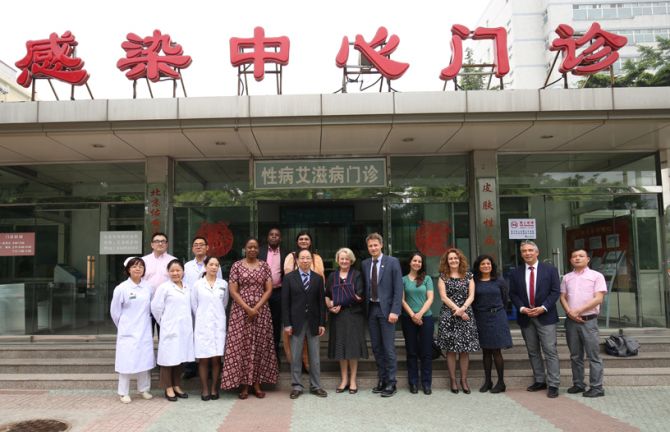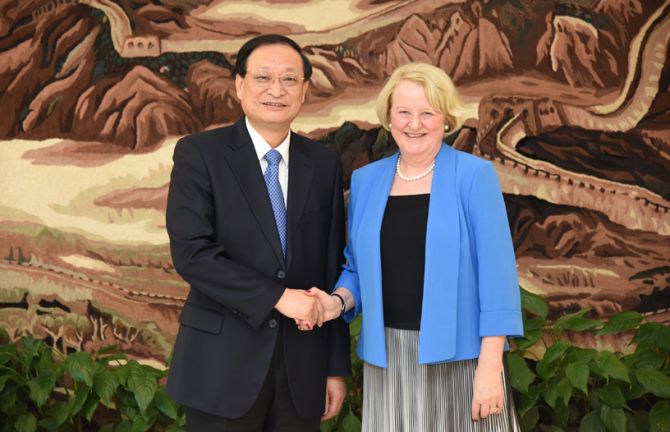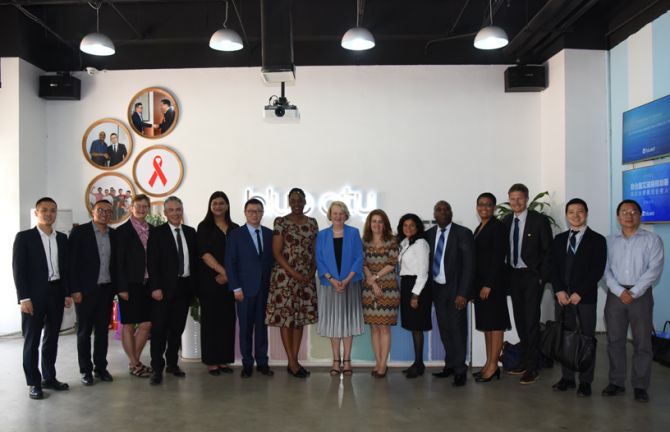



Update
Acceleration and innovation in China’s AIDS response
13 May 2016
13 May 2016 13 May 2016A delegation of the UNAIDS Programme Coordinating Board (PCB) visited China from 9 to 12 May to get insight into how the country’s national AIDS response is on the Fast-Track to end the epidemic as a public health threat by 2030.
The PCB delegation met representatives of the government, civil society and the private sector. Innovative and focused strategies, the engagement of non-traditional stakeholders, accelerated efforts and the importance of political leadership and advocacy on AIDS were identified as critical to Fast-Track the national AIDS response in China.
Confirming China’s commitment to the Sustainable Development Goal target of ending AIDS by 2030, the Vice-Minister of Health, Wang Guoqiang, emphasized China’s support for a strong Political Declaration on Ending AIDS at the United Nations General Assembly High-Level Meeting on Ending AIDS to be held in June. This would be an important driver for further acceleration of the AIDS response globally and in China.
China’s epidemic is concentrated among key populations at higher risk of HIV. Men who have sex with men, especially in major cities, are particularly vulnerable to HIV infection. HIV is prioritized at the highest levels of government and is addressed across sectors. The response is funded almost entirely from domestic resources.
“China’s leadership on HIV is an example of shared responsibility in action, with multisectoral approaches engaging the government, civil society and the private sector drawing on comprehensive national data,” said UNAIDS Deputy Executive Director Jan Beagle, who led the visit. “This can provide important lessons learned across continents, for South–South collaboration and particularly on sustainability,” she added.
Combining science, technology and community action for results
A variety of innovative approaches were showcased during the visit, including Beijing’s response to HIV. The city engages community-based organizations for enhanced service delivery. In addition, it has adopted a one-stop-shop model for HIV testing, has accelerated the test and treat strategy among men who have sex with men, has piloted HIV self-testing programmes and uses new technologies to support HIV prevention and treatment initiatives.
The PCB delegation made a site visit to Danlan, a nongovernmental organization advocating for lesbian, gay, bisexual and transgender rights. Danlan has combined a community-driven HIV prevention programme with a social enterprise scheme through social media—its dating application Blued, which has some 15 million users, includes links to HIV prevention and treatment services. The founder of Danlan, Geng Le, underlined how Blued provides an example of how combining science and technology can integrate the HIV response into the lives of people away from clinics and hospitals.
In discussions with the PCB delegation, members of Beijing’s Health and Family Planning Committee emphasized that their data are showing that community-based organizations, such as Danlan, have been particularly effective in carrying out rapid testing campaigns that reach communities at higher risk of infection. Although small in size, such campaigns have identified some 30% of all new HIV cases in the city.
The private sector’s role
The visit also focused on private sector engagement and action on AIDS within the Chinese national response.
The delegation met with the Red Ribbon Foundation, a national philanthropic fund comprising some 50 companies that are raising funds, providing materials and cooperating with the government on accelerating AIDS efforts.
Discussions with the China Chamber of Commerce for Import and Export of Medicines and Health Products (CCCMHPIE) focused on China’s support for the local production of medicines and health commodities in Africa. With the active engagement of UNAIDS, CCCMHPIE is engaging in technology transfer between Africa and China.
The PCB delegation included representatives of Burundi, Ecuador, El Salvador, Ghana, Norway and Switzerland, as well as the PCB nongovernmental organization delegation and UNAIDS Cosponsors. During the visit, the delegation met with a range of national partners, including representatives of the government at the national and city levels, the National AIDS Committee, civil society and community organizations, business leaders, health-care workers, development partners, media representatives and the United Nations Country Team. The delegation visited several sites in Beijing, where the team saw how the city has scaled up access to HIV prevention, testing and treatment services, including prevention of mother-to-child transmission of HIV and community-based responses.



